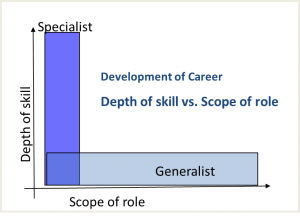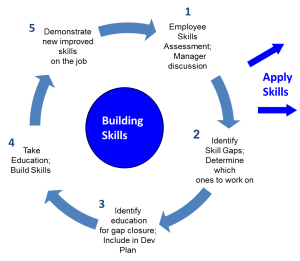In the first part of this blog series (link) last week, I examined the question of whether corporations should consider their employees a short term expenditure or a long term investment. I argued that even though some portion of employees may only be engaged in the short term for peak periods or special projects, companies do need to invest in part of their workforce as long terms partners who understand the business, the market and the customers.
Another dynamic in the employee investment space is the question of nurturing specialists and / or generalists. A specialist is an employee who develops a very deep expertise in one function of the business such as manufacturing, finance, human resource management, or sales support. A generalist, on the other hand, may spend time in several functions within the business and gets a broad understanding of how all the parts of the company come together.
So how does an individual determine if they should become a specialist or generalist? And should a company promote career growth in one or other of these areas over the other?
First, how does one make this choice? Really it should depend on what the employee themselves desires and where their talents lie. Some people love to develop outstanding depth in one area and become a subject matter expert. They love being deep in one area and becoming the “go to” person within the enterprise to help others and enjoy sharing their knowledge. Other people get bored after three or four years in one area. They get restless, yearning to learn and try new things. They enjoy seeing different areas of the business and how the pieces come together. Each person needs to determine their own path – check out my blog on career planning and the kinds of question you can ask yourself to help determine your path.
Second, what should a company promote? Both! Strong enterprises are built on a good mix of specialists and generalists. Companies need both those people who have a deep understand of an area, and those people who understand the large picture and the general landscape. And both sets of people – the generalists and specialists – need each other.
One group should not value themselves over the other group and feel they are more critical. A diverse team that is successful realizes that everyone needs each other and their strength lies in their collective talents.


